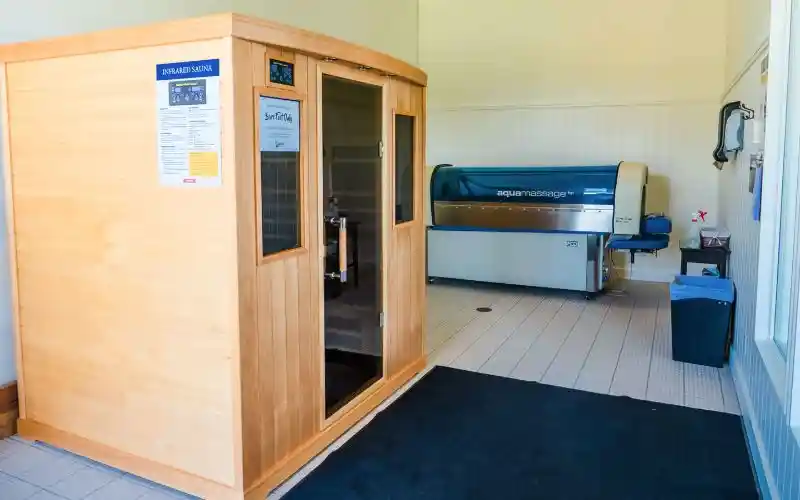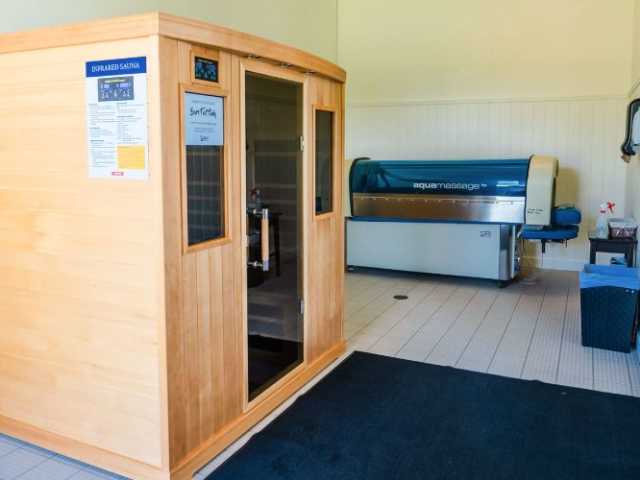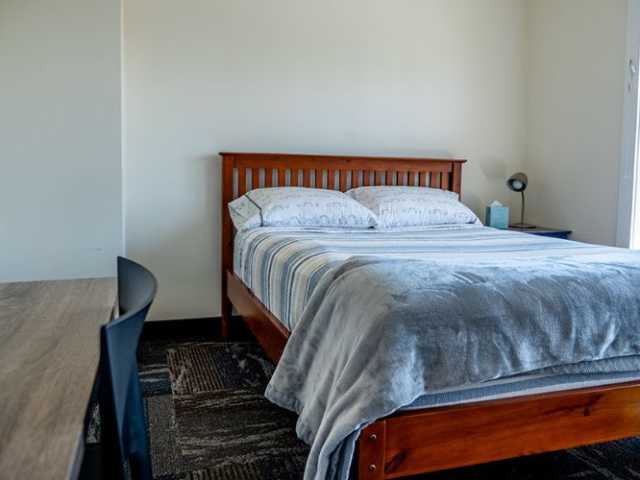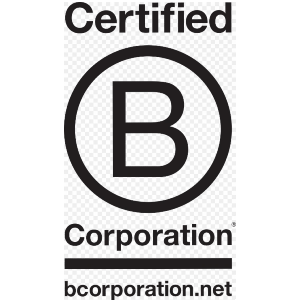
Powell River, British Columbia, Canada
Sunshine Coast Health Centre
Verified
Verified
This provider’s information has been quality-checked by Recovery.com’s Research Team for accuracy and completeness, including center verification through appropriate third-party organizations.
Provider's Policy
At Sunshine Coast Health Centre, we are dedicated to helping you on your journey to recovery with personalized, compassionate care. We accept all major insurance providers to ensure that you have access to the treatment and support you need without added financial stress.
Estimated Cash Pay Rate
The cost listed here ($29,000 - $30,000 CAD (per 30 days)) is an estimate of the cash pay price. Center pricing can vary based on program and length of stay. Contact the center for more information. Recovery.com strives for price transparency so you can make an informed decision.
Highlights from the Center
Highlights
These highlights are provided by and paid for by the center.
Perfect for Professionals
Men Only
Trauma Treatment
About Sunshine Coast Health Centre
Sunshine Coast Health Centre is a men-only residential centre, offering meaning-based treatment for mental health issues such as anxiety, substance and alcohol use disorders, depression, personality disorders, ADHD, PTSD, and trauma. Their non-12-Step treatment philosophy empowers individuals to see themselves as the author of their own lives, with meaning-centered therapy being one way they instill this. Sunshine Coast’s therapists help clients gain an awareness of who they are, how they fit into the world, and their strengths and limitations.
A Serene, Seaside Location
Sunshine Coast is located on 9 beautiful acres with a private oceanfront on British Columbia’s Sunshine Coast. They draw on the healing power of nature to contribute to clients’ recovery, understanding that privacy and immersion in nature can have powerful therapeutic properties. Their impressive range of staff includes 24/7 nurses, therapists, wellness therapists, an addictionologist, and psychiatrists with experience treating mental health and addiction. Each therapist is masters-level. Upon admission, clients receive an assessment from a doctor, who decides if clients should detox or move right into treatment. Sunshine Coast operates with compassion and respect, understanding the importance of dignity and transparency regarding success, comfort, and healing.
Addiction And Mental Health Treatment Without The 12-Steps
Non-12-Step programs make spirituality an option Sunshine Coast provides, not something they insist on. Sunshine Coast focuses on what’s behind addiction, treating trauma, PTSD, anxiety, depression, and other mental health disorders. Qualified therapists provide eye movement and desensitization (EMDR) therapy and somatic experiencing. Other therapies include cognitive behavioral therapy (CBT) and dialectical behavioral therapy (DBT). Sunshine Coast also offers hydrotherapy, art therapy, hypnotherapy, and rTMS (repeated transcranial magnetic stimulation) for depression. During treatment, clients have 10 hours a week of group therapy and meet 1:1 with their primary therapist weekly. Sunshine Coast’s program schedule allows clients to pick from adjunct therapies, including psychoeducation classes, group somatic experiencing, group hypnotherapy, and a writing workshop, among others.
Relax, Recover, And Grow
Sunshine Recovery provides clients with a wholly unique healing experience, starting from their oceanfront location. Clients can enjoy all the amenities that come with this, like swimming, fishing, and other water activities. On-site, they have a pool, a well-stocked fitness room and personal trainer, a sauna, a business center, and more. Internet access and computers keep men connected to work during their stay if need be. Aftercare and alumni services connect clients to recovery resources and a supportive recovery community long after their visit.
Sunshine Coast Health Centre accepts private insurances. They do not accept provincial or territorial insurances.
Read More

Insurance Accepted
Provider's Policy:At Sunshine Coast Health Centre, we are dedicated to helping you on your journey to recovery with personalized, compassionate care. We accept all major insurance providers to ensure that you have access to the treatment and support you need without added financial stress.
Non 12-Step Program
Sunshine Coast believes the recovery process needs to move beyond healing and focus on more than abstinence and reducing harm. At Sunshine Coast Health Centre, clients can experience personal transformation and a full integration back into society. They provide a strengths-based, solutions-focused approach with alternative peer recovery meetings like Recovery Dharma and SMART recovery.
Family Service Program
Sunshine Coast provides an educational family program for clients’ loved ones. The program seeks to educate family members on addiction and mental health, all to better equip family members in supporting their loved one through active recovery. For this program, Sunshine Coast accepts 2 loved ones per client.
Designed for Working Professionals
From military and first responders to business owners and CEOs, Sunshine Coast provides an environment that supports individuals who cannot step away from work while attending addiction treatment fully. Clients can bring phones and laptops or opt for a technology detox during their stay.
An Oceanfront Retreat
Sunshine Coast Health Centre offers an unparalleled setting on 9 private acres of British Columbia’s Sunshine Coast. Nestled between the gentle shores of the Pacific Ocean and the rugged Coastal Mountains, their campus is ideally situated to enhance the recovery experience. Being male-only, Sunshine Coast is also one of the few treatment centres of its kind in Canada.

Center Overview
Estimated Cash Pay Rate
Older Adults
Addiction and mental health treatment caters to adults 55+ and the age-specific challenges that can come with recovery, wellness, and overall happiness.
Executives
Executive treatment programs typically directly support the needs of people who manage businesses and may provide flexible schedules and office space to allow work during treatment.
Young Adults
Emerging adults ages 18-25 receive treatment catered to the unique challenges of early adulthood, like college, risky behaviors, and vocational struggles.
LGBTQ+
Addiction and mental illnesses in the LGBTQ+ community must be treated with an affirming, safe, and relevant approach, which many centers provide.
Midlife Adults
For adults ages 40+, treatment shifts to focus on the unique challenges, blocks, and risk factors of their age group, and unites peers in a similar community.
Mild Disabilities
Adults with mild physical or intellectual disabilities receive treatment catered to their specific needs in a safe and clinically supportive environment.
Professionals
Busy, high-ranking professionals get the personalized treatment they need with greater accommodations for work, privacy, and outside communication.
Veterans
Patients who completed active military duty receive specialized treatment focused on trauma, grief, loss, and finding a new work-life balance.
Treatment Focus
You can admit to this center with a primary substance use disorder or a primary mental health condition. You'll receive support each step of the way and individualized care catered to your unique situation and diagnosis.
Treatment
Specializations
Chronic Relapse
Consistent relapse occurs repeatedly, after partial recovery from addiction. This condition requires long-term treatment.
Co-Occurring Disorders
A person with multiple mental health diagnoses, such as addiction and depression, has co-occurring disorders also called dual diagnosis.
Drug Addiction
Drug addiction is the excessive and repetitive use of substances, despite harmful consequences to a person's life, health, and relationships.
Executives
Executive treatment programs typically directly support the needs of people who manage businesses and may provide flexible schedules and office space to allow work during treatment.
Residential
In a residential rehab program, patients live onsite, with access to daily treatment and 24-hour care. An average stay is 30-90 days.
Trauma
Some traumatic events are so disturbing that they cause long-term mental health problems. Those ongoing issues can also be referred to as "trauma."
Gender-Specific
Separate treatment for men or women can create strong peer connections and remove barriers related to trauma, shame, and gender-specific nuances.
Treatment Services
Detox
Detox fully and safely removes toxic substances from the body, allowing the next steps in treatment to begin with a clean slate.
Intensive Outpatient Program
In an IOP, patients live at home or a sober living, but attend treatment typically 9-15 hours a week. Most programs include talk therapy, support groups, and other methods.
Licensed Primary Mental Health
Some primary care providers offer mental health diagnosis and treatment. This can prevent patients from developing more serious conditions.
Outpatient
During outpatient rehab, patients attend a structured treatment program while continuing to live at home.
Residential
In a residential rehab program, patients live onsite, with access to daily treatment and 24-hour care. An average stay is 30-90 days.
Approaches
Evidence-Based
A combination of scientifically rooted therapies and treatments make up evidence-based care, defined by their measured and proven results.
Individual Treatment
Individual care meets the needs of each patient, using personalized treatment to provide them the most relevant care and greatest chance of success.
Gender-Specific
Separate treatment for men or women can create strong peer connections and remove barriers related to trauma, shame, and gender-specific nuances.
Therapies
1-on-1 Counseling
Patient and therapist meet 1-on-1 to work through difficult emotions and behavioral challenges in a personal, private setting.
Meditation & Mindfulness
A practiced state of mind that brings patients to the present. It allows them to become fully aware of themselves, their feelings, and the present moment.
Transcranial Magnetic Stimulation
Localized magnetic pulses stimulate areas of the brain to increase brain activity and reduce abnormal functions.
Mindfulness Therapy
This ancient practice can be mental, emotional, and even spiritual. In meditation, you focus your attention on the present moment without judgement.
Expressive Arts
Creative processes like art, writing, or dance use inner creative desires to help boost confidence, emotional growth, and initiate change.
Eye Movement Therapy (EMDR)
Lateral, guided eye movements help reduce the emotional reactions of retelling and reprocessing trauma, allowing intense feelings to dissipate.
Family Therapy
Family therapy addresses group dynamics within a family system, with a focus on improving communication and interrupting unhealthy relationship patterns.
Life Skills
Teaching life skills like cooking, cleaning, clear communication, and even basic math provides a strong foundation for continued recovery.
Conditions We Treat
Pornography Addiction
A person with a porn addiction is emotionally dependent on pornography to the point that it interferes with their daily life and relationships.
Schizophrenia
Schizophrenia is a serious mental health condition that causes hallucinations, delusions, and disordered thinking.
Grief and Loss
Grief is a natural reaction to loss, but severe grief can interfere with your ability to function. You can get treatment for this condition.
Personality Disorders
Personality disorders destabilize the way a person thinks, feels, and behaves. If untreated, they can undermine relationships and lead to severe distress.
ADHD, ADD
ADHD is a common mental health condition caused by dopamine imbalance. Common symptoms include inattention, hyperactivitiy, and impulsivity.
Anger
Although anger itself isn't a disorder, it can get out of hand. If this feeling interferes with your relationships and daily functioning, treatment can help.
Anxiety
Anxiety is a common mental health condition that can include excessive worry, panic attacks, physical tension, and increased blood pressure.
Bipolar
This mental health condition is characterized by extreme mood swings between depression, mania, and remission.
Burnout
Burnout entails mental and physical exhaustion, and leads to a severe lack of fulfillment. This condition is often caused by overwork.
Substances We Treat
Alcohol
Using alcohol as a coping mechanism, or drinking excessively throughout the week, signals an alcohol use disorder.
Benzodiazepines
Benzodiazepines are prescribed to treat anxiety and sleep issues. They are highly habit forming, and their abuse can cause mood changes and poor judgement.
Chronic Relapse
Consistent relapse occurs repeatedly, after partial recovery from addiction. This condition requires long-term treatment.
Co-Occurring Disorders
A person with multiple mental health diagnoses, such as addiction and depression, has co-occurring disorders also called dual diagnosis.
Cocaine
Cocaine is a stimulant with euphoric effects. Agitation, muscle ticks, psychosis, and heart issues are common symptoms of cocaine abuse.
Drug Addiction
Drug addiction is the excessive and repetitive use of substances, despite harmful consequences to a person's life, health, and relationships.
Ecstasy
Ecstasy is a stimulant that causes intense euphoria and heightened awareness. Abuse of this drug can trigger depression, insomnia, and memory problems.
Heroin
Heroin is a highly addictive and illegal opioid. It can cause insomnia, collapsed veins, heart issues, and additional mental health issues.
Methamphetamine
Methamphetamine, or meth, increases energy, agitation, and paranoia. Long-term use can result in severe physical and mental health issues.
Aftercare
Experience
Personal Amenities
Amenities
Special Considerations
Clients can bring their own pet(s)
For greater comfort and healing, pet-friendly treatment centers welcome dogs and animal companions to stay with their owners while they attend treatment.
Pet Friendly
For greater comfort and healing, pet-friendly treatment centers welcome dogs and animal companions to stay with their owners while they attend treatment.
Executive Program
Addiction and mental health treatment for executives typically involves high discretion, greater technology access, and more private, 1-on-1 care.
Flexible technology policies
Centers with flexible technology policies allow professionals to stay in touch with work and give patients a greater sense of connection and normalcy.
Gender-specific groups
Patients in gender-specific groups gain the opportunity to discuss challenges unique to their gender in a comfortable, safe setting conducive to healing.
Healthy Meals are provided
Great food meets great treatment, with providers serving healthy meals to restore nutrition, wellbeing, and health.
Activities
Yoga
Yoga is both a physical and spiritual practice. It includes a flow of movement, breathing techniques, and meditation.
Off-Site Activities
Off-Site Amenities
Professional Staff

Geoff Thompson
Program Director
Ph.D, CCC

Jennifer Murray
Nursing Director
RPN

Daniel Jordan
Director of Strategic Development

Sara Klinkhamer
Family Services Counsellor
MA, RCC
View More Team Members
Learn more about Sunshine Coast Health Centre
Testimonial
The whole meaning and purpose approach really clicked with me and I could really identify with something missing in my life, so I felt, even before I got here, that it was a program that would definitely have something to offer and help me with the things I was dealing with.
Rick
Accommodations
Food & Nutrition
Treatment
Value
Pros
- Beautiful Location (40)
- Excellent & Effective Treatment Programming (35)
- Friendly & Competent Staff (38)
- Confidential (32)
Cons
- Disjointed Care (3)
- Generalized Program (2)
- Hidden Costs (2)
- Shallow Post-Treatment Planning (2)
See More
DB
JG
DR
Darryl F
Derek
We love hearing about your treatment experience
Help individuals and families seeking treatment by sharing your first-hand experience with this treatment provider. Review Guidelines.










































